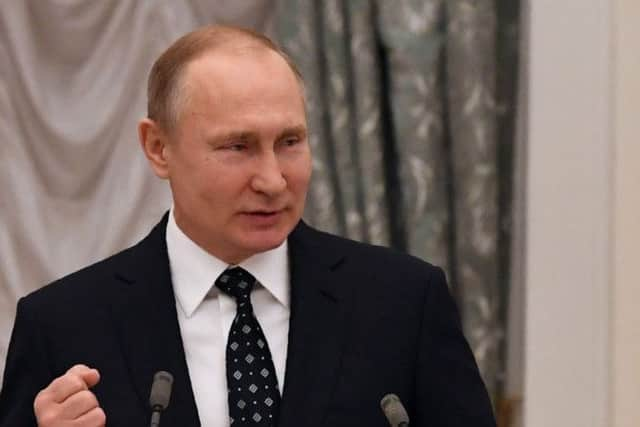Are there concerns about Russian interference in Indyref?
The election of the controversial businessman isn’t the only landmark political event clouded by allegations of external involvement.
There were allegations of dirty tricks online and funnelled money in the Brexit campaign, while both the Cambridge Analytica data scandal and the allegedly Kremlin-ordered attack on a former Russian spy have sharpened focus on the country’s influence on everything from finance to property to politics.
Advertisement
Hide AdAdvertisement
Hide AdScotland’s largest political event ever, the Independence Referendum of 2014, has not been immune to some of these debates.


We look at what fears there are, if at all, of Russian involvement in Scottish Politics.
Conspiracies
Some dark corners of the internet indulged in conspiracy theories following the 55-45 per cent win for the No side in the independence referendum. READ MORE: Kenny MacAskill: UK must stand alone against Russia
Few, however, focused on the influence of Foreign Intelligence services, with the vast majority pointing the finger at the UK’s own spy corps.


At the height of the 2015 General Election campaign, the Telegraph reported the office of an SNP candidate in Argyll and Bute sharing conspiracy theories about Mi5 ‘rigging’ the vote of 2014.
Research by the Electoral Commission in the aftermath of the referendum found as many as 42 per cent of Yes supporters believed on some level, the vote was rigged.
Wikileaks’ Julian Assange told a conference in Glasgow in 2015 that independence activists were ‘entirely justified’ in fearing that British security services would have interfered in the referendum.
False messaging
While the alleged collusion between the Donald Trump campaign and Russian actors remains, for now, unproven, even the President’s supporters concede Russian bots and agents online spread ‘fake news’ during the 2016 election.
Advertisement
Hide AdAdvertisement
Hide AdThis was not unique to the US vote, as experts late last year confirmed that Russian bots had sent hundreds of thousands of messages about independence in the aftermath of the independence referendum.
Swansea University researchers found that nearly 400,000 tweets relating to Scottish political keywords (such as ‘indyref’) were sent by bots.
Ben Nimmo of the Atlantic Council said: “We know the Scottish independence vote was divisive and the model deployed by the Russians is to target geo-political events around the world where they can encourage division.”
“Now in general terms, and for obvious reasons, the Kremlin isn’t keen on independence per se but the disruption would be appealing, not least the potential impact on NATO.”
Chaos Theory
One theory argues that the Kremlin is interested not in backing any nascent political campaigns for ideological reasons, but rather to sow division and chaos in the West, has been used in relation to independence before.
The fact there was a similar uptick in activity by Russian bots relating to the Brexit vote of 2016 has fed concerns about what the Kremlin-funded news organisation Sputnik has planned for their Scottish operation after dozens of journalists set up shop in Edinburgh in 2015.
In an interview with the Scotsman, the head of Sputnik in Scotland claimed that there was nothing untoward about their presence in Scotland.
This has been disputed, not least by Mark Galoetti, an expert on Russian affairs.
Advertisement
Hide AdAdvertisement
Hide AdIn a briefing for the European Council on Foreign Relations, the academic said that among the political organisations supported by Russia’s foreign and security forces were: “separatists from Spain to Scotland.”
The loudest alarm bells about Russian interference in Scottish politics have actually come from abroad.
Senior US Senator Angus King said that far from being home to journalists, the operations of Russia in the UK were in fact merely spy outposts.
He told a committee that agents of Vladimir Putin had ‘set up shop in Scotland, which is discussing independence from Great Britain.’
The Maine Senator said it was part of a sophisticated campaign of disinformation and propaganda, designed to sow chaos in Western Europe.
With the SNP position still that a second independence referendum should take place before the UK leaves the EU, there is clearly still work to do on issues of fake news and cybersecurity, or yet another landmark political event could be overshadowed by claims of Kremlin interference.
